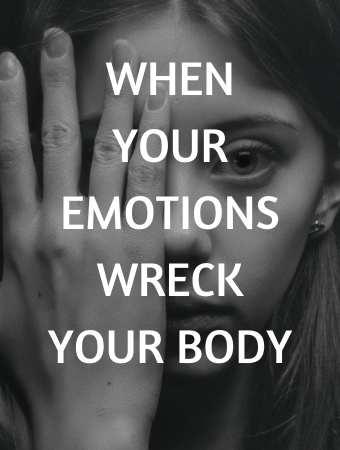
It’s well documented that negative emotions create oxidative stress in the body. They can upset natural hormone balance and damage the immune system. Big, negative emotions deplete the brain chemicals necessary to feel happiness. Anger is just one emotion that’s been linked to high blood pressure, heart disease, and digestive disorders. I suppose I knew all of this, but when your emotions wreck your body, it’s easy to dismiss the signs you should have taken as a warning.
When I lived in toxic mold, my immune system began to break down. A bleeding colon, otherwise known as Ulcerative Colitis (UC), was perhaps the most extreme sign of my body’s inability to detox the continual exposure. My family’s been out of that moldy home for five years now. Until recently, my last true flare was in the fall of 2019. I’ve been in solid remission since the fall of 2020. But this past year, I learned a new lesson. Emotions have power. They can smolder beneath old pathways of inflammation. They can light them ablaze. I learned that when your emotions wreck your body, the road to healing is not just physical.
THE SPARK TO MY EMOTIONAL FIRE
In the late summer of 2022, my husband and I experienced an event that brought big emotions to us both. My husband is a pastor. My undergraduate work was in Christian Education. I have, at times in my life, also served in ministry positions at various churches. You could say this event was professional in nature, but in ministry, it’s hard to draw straight lines. When you’re in ministry, your professional environment is also your place of worship. Ministry doesn’t stay in the doors of the church. It comes home. It’s lived and breathed every day in thought and planning and prayer. There is no escape, so to speak.

Though my husband was involved in this event, for the sake of this post, I’m going to focus on my personal emotions. When this matter occurred, I was overwhelmed with feelings of hurt, betrayal, disappointment, anger, fear, and failure…to name a few. This event was not one moment in time, but a strung out series of happenings that progressed over several months.
Leaving our moldy home was an emotional fire, for sure. This recent mixture of hurt and pain is perhaps second in my life, only to that experience. I hope I’ve conveyed the weight of this event. My heart was heavy. Tormented, in fact. For a while, I burned with all of these feelings. I had yet to learn that these powerful emotions were wreaking havoc on my body. But when your emotions wreck your body, it won’t remain a secret for long.
THE CLINICAL EVIDENCE
Even though I’ve been in remission since the fall of 2020, I periodically see my Integrative GI. Two months after my emotions began to boil, I saw him for a routine appointment. We decided to check on the state of my intestinal inflammation. For years, my numbers had been perfect. But that time, though I had no symptoms at all, my numbers came back elevated. We both thought, “Hm. That’s strange. Let’s check it again in three months.”
Well three months went by…three months that my emotions continued to boil. By that point, I was feeling two things above all others. Hurt and anger. This time when I met with my GI, I had a new symptom to report. I had this strange burning sensation near my stomach. It wasn’t acid reflux. It was too high to be my intestines. My liver ultrasound came back clear. I had kept a food journal. The pain didn’t correspond to anything I was eating. But randomly, throughout the day, my core would burn. We checked for intestinal inflammation again. My numbers were up. Way up. But I still had no symptoms of UC. “How weird,” we both said.

For months, I felt a burning sensation near my stomach. We never could reach a clinical diagnosis.
Fast forward to the spring of 2023. Another three months had gone by. We checked inflammation markers one more time. They were high. Almost as high as when I was hospitalized in 2018. “I don’t understand it,” my GI said. “In any other patient with numbers this high, symptoms would be severe.” I was experiencing a little weirdness at that time. Some bloating. A little discomfort. Nothing severe. But when your emotions wreck your body, sometimes you don’t see it coming. Sometimes, it sneaks up on you.
INFLAMMATION ABLAZE
Two weeks later, my nineteen year old car died for good. We knew it was coming. We knew it was ultimately inevitable. But still, we weren’t quite ready. We weren’t ready financially. Apparently, I wasn’t ready emotionally. That car was the last tie to “old me.” When we left our moldy house, we got rid of everything we owned. That car was my last connection to my past. My last connection to “before.” I started bleeding again the day the car was towed away. That stupid car (it’s just a car!) was the emotional tip to my scales.
I primarily want this post to be about emotional health, so I won’t talk in detail about my physical steps to healing, though there were many. Knowing what I learned from DNRS, I approached this flare differently from others. I focused my mind on healing and projected positive outcomes over my body. I have more tools in my toolbox than I had the first time I dealt with UC. From the first appearance of symptoms, I didn’t waste any time in panic or frantically searching for answers. I was calm, pragmatic, and practical, and I think that went a long way toward stabilizing what could have easily swung into something more serious. In a way, I found stability and healing by managing my emotional response to the flare.
When your emotions wreck your body, the treatment involves a steady look at those wayward emotions. So let’s move along to examine the emotional state that set my inflammatory fire ablaze.
EMOTIONAL DAMAGE AND LESSONS LEARNED
Emotions are big and real. We can’t un-feel them. We can’t just turn them off. So how are we to respect an emotional state, without giving it the weight to wreck our bodies with inflammation? I’m not sure that I have all the answers, but here is what I’ve learned through this experience.
DON’T SPEND ALL OF YOUR TIME TALKING ABOUT IT
For most of last fall, I talked with my husband and other family members about what happened. Sometimes I brought it up. Sometimes they did. I think the impression was that talking through pain would somehow alleviate it, but the reality is that talking through pain (at least in this case), only added fuel to the fire of negative emotions. It sort of made me dig my feet in. Each time anyone brought it up, I felt like my hurt and anger and frustration were all justified, and so I wallowed in those emotions. It wasn’t a healing response. It perpetuated my state of righteous indignation.
ACKNOWLEDGE YOUR EMOTIONS, NAME THEM, AND MOVE TO A POINT OF RESOLUTION
While you don’t have to talk about events over and over again, you do need to deal with the emotional trauma that ensued. I think, at least in part, this emotional experience was so heavy for me because it was laid upon the open wounds of mold trauma that I had yet to deal with. Because of our hasty exit from the moldy home, I felt displaced, unstable, and ungrounded. Most of all, I felt like the trajectory of my life was outside of my control. This new experience took me by surprise in a similar way. It threatened the stability my family had only just begun to build. It stirred up old fears and compounded emotions I’d buried.
FORGIVE YOURSELF AND OTHERS, EVEN IF AN “I’M SORRY” ISN’T OFFERED
I found the book, “Forgiving What You Can’t Forget” to be helpful in my journey toward healing. I worked through the author’s questions and found it to be a cathartic experience. The questions urged me to face my emotions and put words to their previously hazy shape. As an example, a few of the author’s questions are:
- What do I believe about the people who hurt me?
- What do I now believe about myself?
- What do I believe about people who witnessed the situation?
- What do I now believe about the world because of this situation?
You can see how these questions might apply to many different life events. No matter what you’re facing, I believe that forgiveness is in the direction of peace. Ultimately, whatever I could not achieve on my own through written work or counseling, I humbly presented to the Lord in prayer. God’s peace can transcend whatever hurt we’re feeling. He can help whatever anger is burning within us. He can bring forgiveness to our stubborn hearts when we can’t find it on our own.
AND WITH JOY WE ARE HEALED
I met with my GI again in June. We talked about that burning sensation that we never could diagnose. It’s gone now. We could only equate it to a deep, smoldering sense of anger. We spent my entire appointment talking about the weight of emotions and the havoc they wreak upon one’s health. Negative emotions can open the door to cancer. They can cause a heart attack. They can reawaken a dormant auto-immune disease. Negative emotions are flat out dangerous to our health. But we both agreed, negative emotions are not the fault of anyone else’s actions. They’re a self-created response to the world around us. For stable health and well-being, we must learn to handle those emotions with due attention while also submitting our hearts to the Lord’s care.

Anger is a beast that boils deep within. It must be put away for joy.
Ephesians 4:31 says, “Let all bitterness and wrath and anger and clamor and slander be put away from you, along with all malice.” That’s not just for everyone else’s benefit, but for the healing of our own hearts. In ministry, it’s often hard to have one’s professional, spiritual, and personal life be so completely entangled. As much as such a relationship can bring pain, it’s also in that relationship, in the church, that we find healing. Romans 5: 3-5 says, “We rejoice in our sufferings, knowing that suffering produces endurance, and endurance produces character, and character produces hope, and hope does not put us to shame, because God’s love has been poured into our hearts through the Holy Spirit who has been given to us.” When your emotions wreck your body, it is with joy in suffering that you are healed.






Leave a Reply
You must be logged in to post a comment.